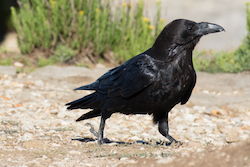The crow family, the apes of the bird world?
Researchers from Lund University in Sweden, with EU support in the form of an International Career Grant, conducted four experiments. One of these showed that 78% of the ravens (Corvus corax) involved were able to successfully barter with a human to exchange goods. Other experiments showed the birds were able to exert self-control when making decisions. This is particularly significant since well-developed self-control is essential to planning as impulsivity makes it hard to go beyond the immediate context. In their study, published in ‘Science’, the team explains each experiment included two main conditions: tool-use and bartering with humans. Ravens, the team says, are not habitual tool users and bartering has never been observed in the wild. The researchers chose to focus on these elements for three of the four experiments to replicate key experiment involving primates. The fourth, they explain, went further, extending what has been done in primate studies. Challenging the ravens There is skepticism concerning whether corvid planning really is functionally similar to that of hominids. It has been contended that the – admittedly flexible – skills of corvids, which are habitual food cachers, may instead reflect adaptations confined to the food-caching domain. The team decided that testing the ravens in tasks for which they have no ecological or behavioral predispositions could shine a light on this key question. For this reason, four experiments were conducted. Experiment one set out to establish whether ravens can select, save and later use a tool, or a token that can be exchanged. To add complexity, there was a 15-minute lag between when the birds could take the tools from one location and then use them in a different environment. In the tool condition, the subjects successfully selected and used the tool to solve the task in an average of 11 trials out of 14. In the bartering condition, the birds selected in total 143 tokens out of 144. At least one token was exchanged in 91.6% of the trials. The second experiment extended the delay between item selection and use to 17 hours. The three ravens selected used the tool in 88.8% of the cases and in the bartering condition, the mean success rate of the four ravens used was 95.8%. The third considered planning and self-control. It presented the subjects with a distraction, a tool and an immediate reward. The tool would give the raven access to more valuable reward 15 minutes later. In the control conditions, in which no tool or token was offered, all the birds selected the immediate reward. Once presented with the additional option of a tool or token, subjects selected the tool on average in 73.8% of the time, and the token 73.2%. The fourth experiment gave the team the chance to see if the ravens, ‘would select the functional item more often when the reward was spatiotemporally closer than in experiment 3.’ All subjects declined the immediate reward and instead selected and used the functional item in 100% of trials – a significant increase relative to experiment three. Significance of research into corvid cognition What makes this study, and others like it, so interesting is that it indicates an independent evolution of complex cognition, which is a fascinating idea, because, as one co-author puts it, ‘It shows that evolution sometimes likes to rerun good solutions. In this case, it's planning skills.’ Ravens are avian dinosaurs that shared an ancestor with mammals around 320 million years ago. The conspicuous similarities in performance to great apes in tasks such as these open up avenues for investigation into the evolutionary principles of cognition and shows what the brains of some birds are capable of. For more information, please see: CORDIS project wepage
Countries
Sweden



